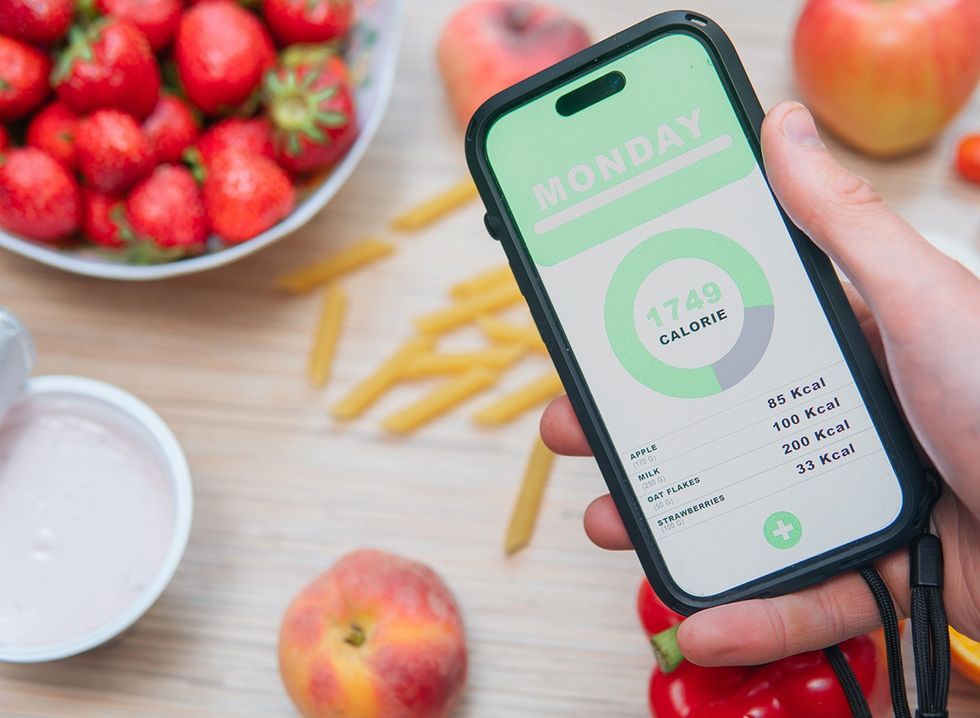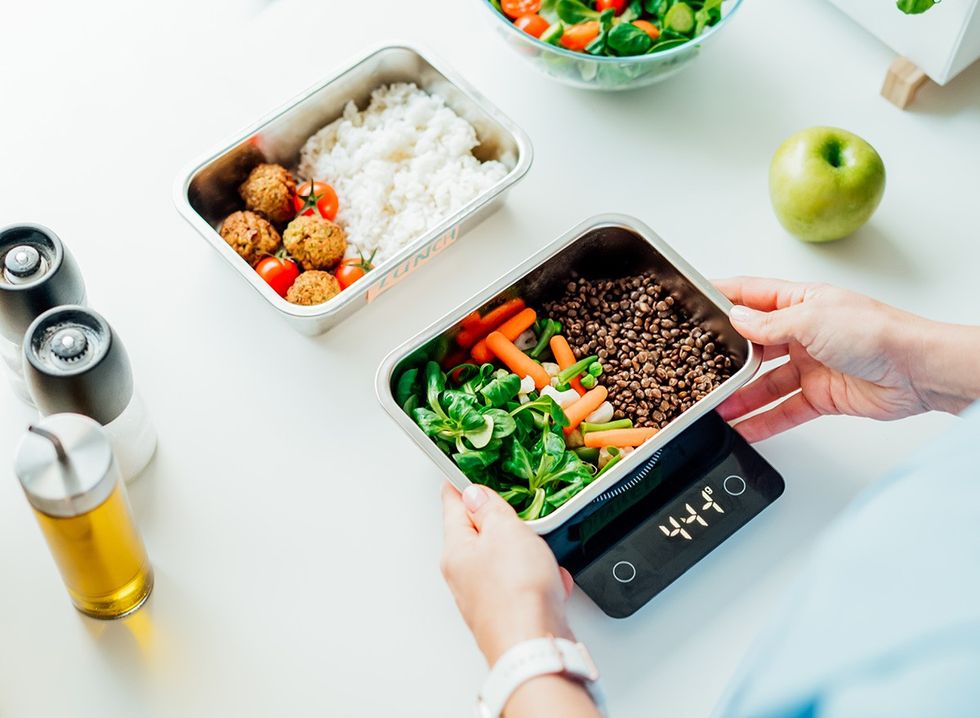Do you want a flatter tummy in two months? Making a few simple health and lifestyle changes can make a huge impact when it comes to belly bulge, according to Kylie Bensley, MS, RD, Certified Nutritionist, Clinical Dietician and Founder of Sulinu. Here are 20 abdominal fat-blasting tips for a flatter stomach in 60 days.
Swap Sweet Sodas for Tea and Stevia
 Shutterstock
Shutterstock
“Swap soda and flavored drinks for a drink that’s a mix of green tea and black tea sweetened with a splash of stevia,” Bensley recommends. “The thermogenic effect of the green tea will slightly raise your metabolism, and the swap from the sodas will clean up your diet from harmful chemicals.”
Stick to Lower Calorie Dessert
 Shutterstock
Shutterstock
You don’t have to quit eating dessert to blast belly fat. “Satisfy your sweet cravings with a dessert under 300 calories. This keeps you from binging and eating empty sugar foods,” Bensley advises.
Switch to Higher Intensity Workouts
 Shutterstock
Shutterstock
If you are doing lower intensity workouts, consider upping the intensity. “Do higher intensity exercise such as HIIT which is shown to lower the visceral fat (the fat around the organs),” recommends Bensley.
RELATED: I Lost 20 Pounds with the 12-3-30 “Advanced” Walking Workout
Hydrate
 Shutterstock
Shutterstock
Hydration should also be a priority. “Hit your fluid goals with a minimum of 64 fluid ounces; 96 ounces on hotter days or days you exercise,” she says. Pro tip? “It’s best to consume water in the morning before anything else.”
Limit Electrolyte Water
 Shutterstock
Shutterstock
Next, limit electrolyte waters. “Some of them contain over 1,000 mg of sodium (2,000mg is the daily limit), and without the proper balancing of other minerals, the excess sodium can result in overall swelling,” says Bensley.
Avoid Drinking Your Calories
 Shutterstock
Shutterstock
Avoid drinking your calories. “The average American consumes 400 calories via beverages daily,” says Bensley. “Opt for sugar-free choices such as tea, water, or water flavored with fruits or cucumber.”
Go Salt-Free
 Shutterstock
Shutterstock
“Substitute salt for salt free items,” says Bensley. “The body retains more water resulting in a higher number on the scale when you consume too much salt.”
Eat at Home More Often
 Shutterstock
Shutterstock
Eat at home more often than not, Bensley recommends. “This way, you have control over what goes in your food and can monitor calories,” she says.
Consume High Potassium Food
 Shutterstock
Shutterstock
Consume high potassium foods to limit swelling,” says Bensley. “Potassium regulates sodium, therefore, it lowers the water retention in the body caused by sodium.”
Drink Green Tea
 Shutterstock
Shutterstock
Drinking green tea may help you slip down. “Several studies on green tea catechins show that although the weight loss effects are modest, a significant percentage of fat loss is harmful visceral fat,” she says.
Modify Your Approach to Eating
 Shutterstock
Shutterstock
Modifying your approach to eating is key, Bensley maintains. “See food as fuel, not an enemy,” she encourages. “Try to eat 30g of high protein at every meal, 25+ grams of high fiber will help increase satiety to keep you fuller for longer and give you more energy.”
Understand Hunger Cues
 Shutterstock
Shutterstock
Understanding hunger cues is key, says Bensley. “Eat when you are hungry, not when you are ravenous, and stop eating when you are satisfied, not when you are overly full or stuffed.”
Chew Thoroughly
 Shutterstock
Shutterstock
Chew everything to applesauce consistency, Bensley says. “This will slow down the eating process. You are likely to feel more satisfied when eating because it gives food time to travel to your stomach. It also helps with the digestive process by breaking down food in the mouth rather than in the digestive system, which may also help with bloating,” she explains.
Intermittently Fast
 Shutterstock
Shutterstock
Intermittent fasting is effective for belly fat loss, according to Bensley. “Choose a fasting window that will help you eat less throughout the day. A window of fasting can be between 12 to 16 hours,” she says.
Eat Probiotic Food
 Shutterstock
Shutterstock
Eat probiotic food daily, Bensle suggests. “This promotes healthy gut bacteria and can also reduce bloating.” Good choices include yogurt, kefir, cottage cheese, cheddar cheese, sauerkraut, kombucha, pickled vegetables, kimchi, miso, and tempeh.
Drink Mocktails, Not Cocktails
 Shutterstock
Shutterstock
“Swap alcohol for low-sugar mocktails,” Bensley recommends, sharing the following recipe.
Ingredients:
- ½ cup pear juice
- 2 tbsp pomegranate seeds
- ½ cup fruit kombucha
- ½ lemon, juiced
- 2 sprigs rosemary
Directions:
- Combine pear juice, kombucha, pomegranates, lemon juice and ice in a blender cup or cocktail shaker
- Shake vigorously before pouring into your favorite glass
- Garnish with rosemary and/or pear slices
Eat Digestive Bitters
 Shutterstock
Shutterstock
Eating digestive bitters can also impact your waistline. “This helps your body release gut hormones that make you feel full and can help you produce more saliva, which helps with digestion,” she says.
Drink Herbal Tea
 Shuttestock
Shuttestock
Drinking herbal teas, such as fennel tea, can help you debloat. “Commonly used in India, this seed is consumed after meals to banish tummy bloat,” says Bensley.
Avoid Gassy Food
 Shutterstock
Shutterstock
Avoid gas-producing foods, Bensley recommends. “These include beans, cruciferous vegetables (brussels sprouts, broccoli, cauliflower), carbonated beverages, onions and garlic. Cruciferous vegetables contain the sugar raffinose, which is a gas-producing sugar,” she says.
RELATED: 10 Ways to Slim Down at Lunchtime if You're 50+
Reduce Your Calorie Intake
 Shutterstock
Shutterstock
Finally, slightly lower your caloric deficit. “A 250 calorie deficit daily will result in a 0.5lb weight loss/week; a 500 calorie deficit per day will result in a 1lb weight loss/week,” Bensley points out.
💪🔥Body Booster: Eat probiotic food daily. It will help promote healthy gut bacteria and can also reduce bloating.



















 Shutterstock
Shutterstock Shutterstock
Shutterstock Shutterstock
Shutterstock Shutterstock
Shutterstock Shutterstock
Shutterstock Shutterstock
Shutterstock Shutterstock
Shutterstock Shutterstock
Shutterstock Shutterstock
Shutterstock Shutterstock
Shutterstock
 Shutterstock
Shutterstock Shutterstock
Shutterstock Shutterstock
Shutterstock alexxandra.fitt/Instagram
alexxandra.fitt/Instagram


 Shutterstock
Shutterstock Shutterstock
Shutterstock Shutterstock
Shutterstock Shutterstock
Shutterstock Shutterstock
Shutterstock Shutterstock
Shutterstock Shutterstock
Shutterstock Shutterstock
Shutterstock Shutterstock
Shutterstock Shutterstock
Shutterstock Shutterstock
Shutterstock
 Shutterstock
Shutterstock Shutterstock
Shutterstock Shutterstock
Shutterstock Shutterstock
Shutterstock Shutterstock
Shutterstock Shutterstock
Shutterstock Shutterstock
Shutterstock Shutterstock
Shutterstock Shutterstock
Shutterstock Shutterstock
Shutterstock Shutterstock
Shutterstock Shutterstock
Shutterstock Shutterstock
Shutterstock Shutterstock
Shutterstock Shutterstock
Shutterstock Shutterstock
Shutterstock Shutterstock
Shutterstock Shuttestock
Shuttestock Shutterstock
Shutterstock Shutterstock
Shutterstock

 I'm a Nutritionist and These 9 High-Protein Snacks Keep My Clients Full While Losing 50 Pounds
I'm a Nutritionist and These 9 High-Protein Snacks Keep My Clients Full While Losing 50 Pounds
 Shutterstock
Shutterstock 2. Processed FoodsShutterstock
2. Processed FoodsShutterstock Shutterstock
Shutterstock Shutterstock/Prostock-studio
Shutterstock/Prostock-studio Shutterstock
Shutterstock Pro TipsShutterstock
Pro TipsShutterstock Shutterstock
Shutterstock Shutterstock
Shutterstock Shutterstock
Shutterstock Shutterstock
Shutterstock Don’t Drink as Much AlcoholShutterstock
Don’t Drink as Much AlcoholShutterstock Most Women on GLP-1s Are Making a Few Common MistakesShutterstock
Most Women on GLP-1s Are Making a Few Common MistakesShutterstock Soda and Sugary DrinksShutterstock
Soda and Sugary DrinksShutterstock Shutterstock
Shutterstock Eat BreakfastShutterstock
Eat BreakfastShutterstock And Improve Insulin SensitivityShutterstock
And Improve Insulin SensitivityShutterstock Belly Flab Strip Tip: Sugar and Fat Calories Leave Its Mark on Your BodyShutterstock
Belly Flab Strip Tip: Sugar and Fat Calories Leave Its Mark on Your BodyShutterstock Shutterstock
Shutterstock The Drugs Mimic the GLP-1 Hormone Naturally Produced by the BodyShutterstock
The Drugs Mimic the GLP-1 Hormone Naturally Produced by the BodyShutterstock 3. Deep-Fried ItemsShutterstock
3. Deep-Fried ItemsShutterstock